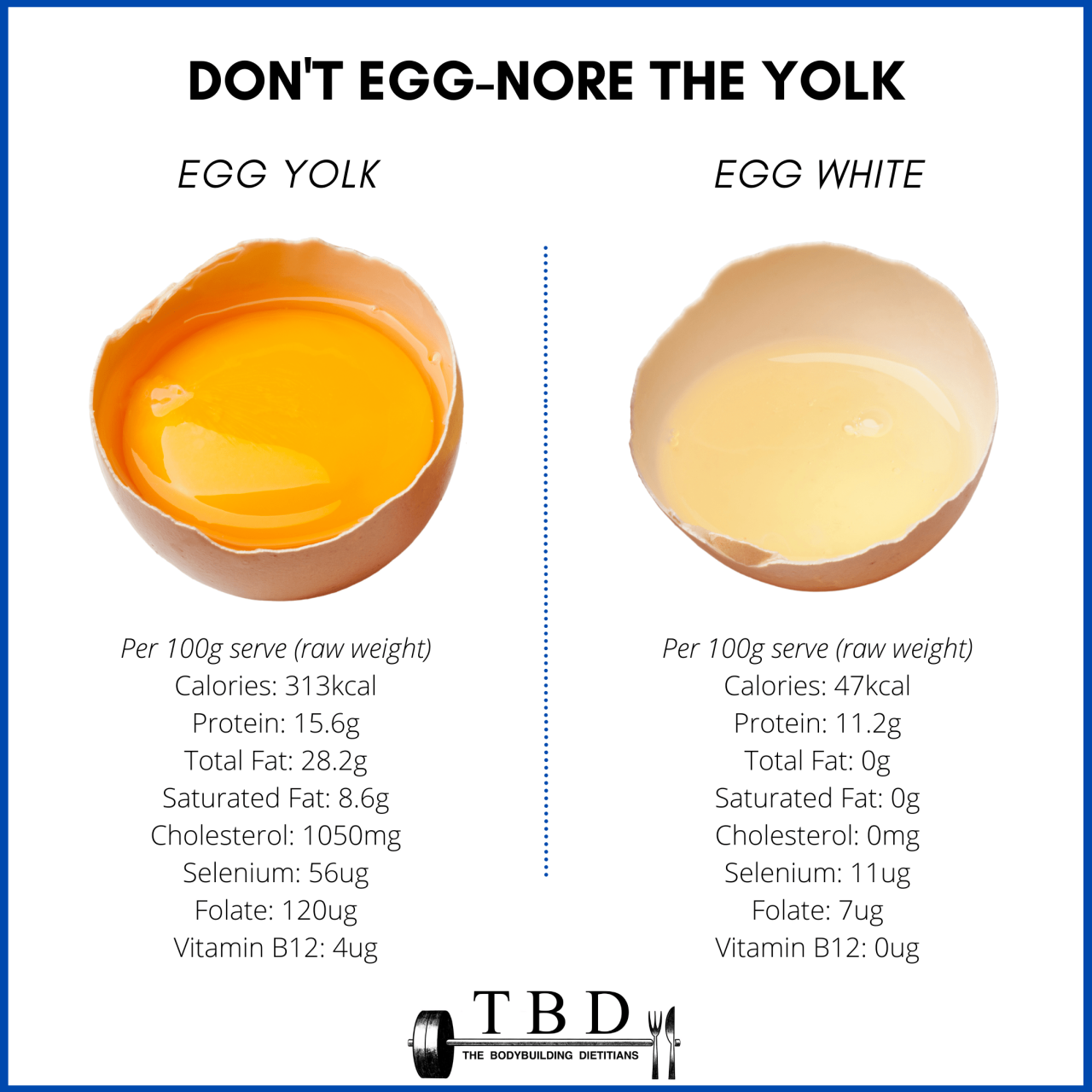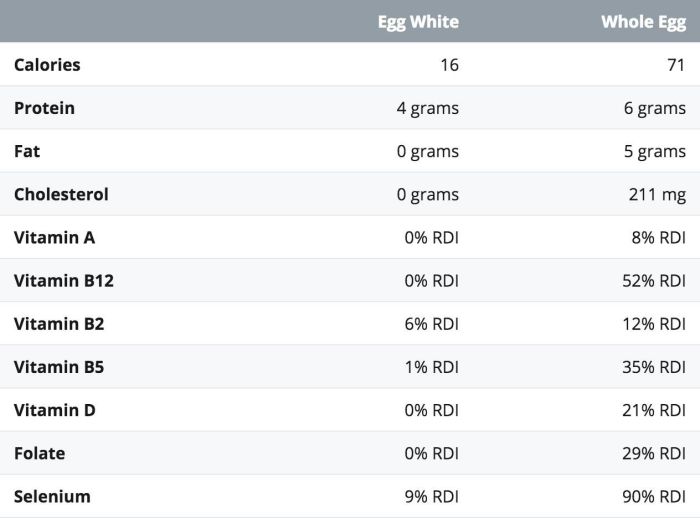Nutritional Profile of 3 Egg Whites
Nutrition 3 egg whites – Three egg whites offer a powerhouse of protein and essential nutrients, making them a popular choice among health-conscious individuals and athletes alike. This detailed breakdown explores the macronutrient composition, vitamin and mineral content, amino acid profile, and compares it to other common protein sources.
Macronutrient Composition of 3 Egg Whites
Three large egg whites contain approximately 20-25 grams of protein, less than 1 gram of fat, and negligible carbohydrates. This makes them an excellent source of high-quality protein with minimal calories and fat. The protein content is crucial for building and repairing tissues, supporting immune function, and promoting satiety. The low fat and carbohydrate content makes them suitable for various dietary needs, including low-carb and ketogenic diets.
Vitamin and Mineral Content of 3 Egg Whites
Egg whites are a good source of several essential vitamins and minerals, although their bioavailability can vary depending on individual factors. Three egg whites provide a significant amount of riboflavin (vitamin B2), crucial for energy metabolism, and selenium, an important antioxidant. They also contribute smaller amounts of other vitamins like vitamin B12, niacin, and minerals such as potassium and zinc.
Three egg whites offer a significant protein boost, ideal for muscle building and satiety. However, considering complete nutrition, it’s helpful to compare this protein source to others; for example, you might want to check out the milk bone nutrition facts to see how it stacks up in terms of calcium and other essential nutrients. Ultimately, a balanced diet incorporating diverse protein sources, like egg whites, is key for optimal health.
The bioavailability of these nutrients is generally high, meaning the body can effectively absorb and utilize them.
Amino Acid Profile of 3 Egg Whites and Muscle Building
Egg whites boast a complete amino acid profile, meaning they contain all nine essential amino acids that our bodies cannot produce on their own. This complete profile is particularly important for muscle protein synthesis. Essential amino acids like leucine, isoleucine, and valine are branched-chain amino acids (BCAAs) that play a vital role in muscle growth and repair. The high concentration of these BCAAs in egg whites contributes to their effectiveness in supporting muscle building and recovery, especially beneficial for individuals engaging in regular exercise.
Comparison of 3 Egg Whites to Other Protein Sources
The following table compares the nutritional content of 3 egg whites to other popular protein sources, per 100g serving. Note that values can vary slightly depending on the source and preparation method.
| Nutrient | 3 Egg Whites (approx.) | Chicken Breast | Tofu |
|---|---|---|---|
| Protein (g) | 30-35 | 30-31 | 8-10 |
| Fat (g) | <1 | 2-3 | 4-10 |
| Carbohydrates (g) | <1 | 0 | 2-4 |
| Calories | 75-100 | 165-170 | 70-100 |
Preparation and Handling of Egg Whites: Nutrition 3 Egg Whites

Maintaining the quality and safety of egg whites is crucial for achieving optimal results in your culinary creations. Improper handling can lead to bacterial contamination and compromise both the taste and nutritional value. This section details safe practices for handling and storing egg whites, ensuring your dishes are both delicious and safe to consume.
Safe Handling Practices for Egg Whites
Preventing bacterial contamination is paramount when handling egg whites. Always wash your hands thoroughly with soap and water before handling eggs. Crack eggs individually into a separate bowl, rather than directly into a mixing bowl, to prevent the spread of bacteria from a potentially contaminated egg. Discard any eggs with cracked shells or unusual odors. Use clean, sanitized utensils and bowls throughout the process.
Avoid cross-contamination by keeping raw egg whites separate from other foods. Remember, prompt refrigeration is key to maintaining freshness and inhibiting bacterial growth.
Separating Egg Whites from Yolks
Efficiently separating egg whites from yolks is a fundamental skill in cooking. The simplest method involves cracking the egg gently onto a clean, flat surface. Using your fingers, carefully lift the yolk and allow the white to drain into a separate bowl. For a more precise separation, especially when making delicate meringues, you can use an egg separator tool.
These tools usually have a small cup that catches the yolk while allowing the white to pass through. Another technique involves using an empty plastic bottle to suck up the yolk. Simply squeeze the bottle, place the opening over the yolk, and release the pressure to draw the yolk into the bottle.
Methods for Storing Egg Whites
Proper storage is essential to maintain the freshness and quality of separated egg whites. For short-term storage (up to 2 days), cover the bowl containing the egg whites tightly with plastic wrap, ensuring the wrap is in direct contact with the surface of the egg whites to prevent a skin from forming. Refrigerate immediately. For longer storage (up to a week), transfer the egg whites to an airtight container, again ensuring minimal air exposure.
Freezing egg whites is also an option for longer preservation (up to 3 months). Pour the egg whites into ice cube trays or freezer-safe bags, leaving some space for expansion. Once frozen, transfer the cubes or bags to a larger freezer bag for long-term storage. Remember to label and date the containers for easy tracking.
Visual Representation of Egg White Separation and Storage
Imagine cracking an egg gently onto a clean countertop. The clear, viscous egg white flows easily, while the round, golden yolk remains intact. Using your fingers or an egg separator, carefully lift and transfer the yolk to a separate bowl, leaving the egg white behind. The separated egg white is then transferred to a clean, airtight container – either a bowl covered tightly with plastic wrap for short-term storage or a freezer-safe container for longer storage.
For frozen egg whites, picture small, perfectly formed cubes of egg white nestled in an ice cube tray or neatly packaged in a freezer bag. Each container is clearly labeled with the date, ensuring easy identification and preventing spoilage. The image showcases the careful handling and meticulous storage that guarantees the preservation of the egg whites’ quality.
3 Egg Whites in Different Diets

Three egg whites, a lean protein powerhouse, offer versatility across various dietary approaches. Their nutritional profile, rich in protein and low in fat and carbohydrates, makes them a valuable addition to many meal plans, but their suitability varies depending on the specific dietary goals and restrictions. Let’s explore how three egg whites integrate into different popular diets.
Three Egg Whites in High-Protein Diets
High-protein diets often focus on maximizing protein intake to support muscle growth, weight loss, or overall satiety. Three egg whites contribute significantly to this goal. Each egg white provides approximately 3-4 grams of protein, meaning three egg whites supply roughly 9-12 grams. This substantial protein boost can be easily incorporated into breakfast, lunch, or as a post-workout snack. For instance, three egg whites scrambled with vegetables can be a part of a balanced high-protein breakfast, contributing to the daily protein target.
The low-fat nature of egg whites is also beneficial in high-protein diets, where minimizing fat intake is often a priority.
Three Egg Whites in Low-Carbohydrate Diets, Nutrition 3 egg whites
Low-carbohydrate diets, such as ketogenic diets, aim to minimize carbohydrate consumption to induce ketosis, a metabolic state where the body burns fat for energy. Three egg whites are exceptionally well-suited for these diets because they are virtually carbohydrate-free. Their high protein content also contributes to satiety, helping to curb cravings and maintain energy levels without relying on carbohydrates.
A simple omelet made with three egg whites and low-carb vegetables is a perfect example of a keto-friendly meal.
Three Egg Whites in Vegetarian and Vegan Diets
While three egg whites are inherently non-vegetarian, they can still be considered within the context of vegetarian diets (ovo-vegetarian, which includes eggs). However, they are unsuitable for vegan diets, which exclude all animal products. Vegans seeking a similar protein source can turn to alternatives like tofu, tempeh, lentils, or plant-based protein powders. These alternatives offer comparable protein content but may lack the specific amino acid profile of egg whites.
It’s crucial for vegans to ensure they consume a variety of plant-based protein sources to achieve a complete amino acid profile.
Three Egg Whites Across Different Dietary Approaches
| Dietary Approach | Suitability of 3 Egg Whites | Considerations | Example Meal |
|---|---|---|---|
| Ketogenic | Excellent | High protein, very low carb | 3 egg white omelet with spinach and cheese |
| Paleo | Excellent | Whole, unprocessed foods; aligns with ancestral eating patterns | 3 egg whites scrambled with mushrooms and onions |
| Mediterranean | Good | Part of a balanced diet rich in fruits, vegetables, and healthy fats | 3 egg whites poached, served with a side of Greek yogurt and vegetables |
| High-Protein | Excellent | Significant protein contribution with low fat | 3 egg whites added to a protein shake or smoothie |
Essential FAQs
Are egg whites a complete protein source?
While egg whites are an excellent source of protein, they are not considered a
-complete* protein source on their own because they lack the amino acid methionine. However, when combined with other foods, they provide all essential amino acids.
Can I consume 3 egg whites daily without any health risks?
For most healthy individuals, consuming 3 egg whites daily is unlikely to pose significant health risks. However, individuals with kidney issues or those sensitive to high-protein diets should consult a doctor or registered dietitian before significantly increasing their egg white intake.
How long can I store separated egg whites in the refrigerator?
Separated egg whites should be stored in an airtight container in the refrigerator for up to 2-3 days for optimal freshness. Always check for any off-odors or unusual appearance before using.
What are some alternatives to egg whites for vegans?
Vegans can obtain comparable protein from sources like tofu, tempeh, lentils, quinoa, and various plant-based protein powders.
